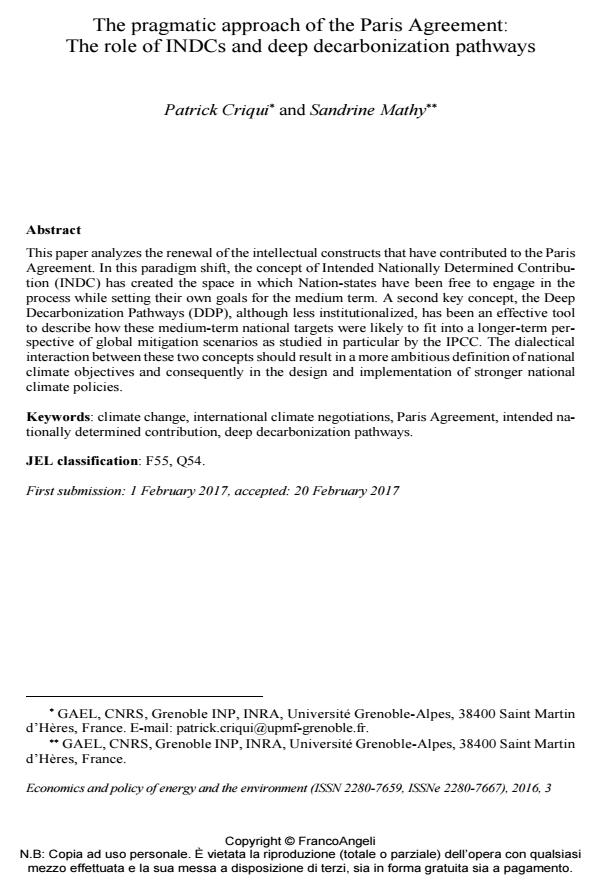The pragmatic approach of the Paris Agreement: The role of INDCs and deep decarbonization pathways
Titolo Rivista ECONOMICS AND POLICY OF ENERGY AND THE ENVIRONMENT
Autori/Curatori Patrick Criqui, Sandrine Mathy
Anno di pubblicazione 2017 Fascicolo 2016/3 Lingua Inglese
Numero pagine 9 P. 79-87 Dimensione file 167 KB
DOI 10.3280/EFE2016-003007
Il DOI è il codice a barre della proprietà intellettuale: per saperne di più
clicca qui
Qui sotto puoi vedere in anteprima la prima pagina di questo articolo.
Se questo articolo ti interessa, lo puoi acquistare (e scaricare in formato pdf) seguendo le facili indicazioni per acquistare il download credit. Acquista Download Credits per scaricare questo Articolo in formato PDF

FrancoAngeli è membro della Publishers International Linking Association, Inc (PILA)associazione indipendente e non profit per facilitare (attraverso i servizi tecnologici implementati da CrossRef.org) l’accesso degli studiosi ai contenuti digitali nelle pubblicazioni professionali e scientifiche
This paper analyzes the renewal of the intellectual constructs that have contributed to the Paris Agreement. In this paradigm shift, the concept of Intended Nationally Determined Contribution (INDC) has created the space in which Nation-states have been free to engage in the process while setting their own goals for the medium term. A second key concept, the Deep Decarbonization Pathways (DDP), although less institutionalized, has been an effective tool to describe how these medium-term national targets were likely to fit into a longer-term perspective of global mitigation scenarios as studied in particular by the IPCC. The dialectical interaction between these two concepts should result in a more ambitious definition of national climate objectives and consequently in the design and implementation of stronger national climate policies.
Keywords:Climate change, international climate negotiations, Paris Agreement, intended nationally determined contribution, deep decarbonization pathways.
Jel codes:F55, Q54.
- Barker T., Bashmakov I., Alharthi A., Amann M., Cifuentes L., Drexhage J., Duan M., Edenhofer O., Flannery B., Grubb M., Hoogwijk M., Ibitoye F.I., Jepma C.J., Pizer W.A. and Yamaji K. (2007). Mitigation from a cross-sectoral perspective. In: Climate Change 2007: Mitigation. Contribution of Working Group III to the Fourth Assessment Report of the Intergovernmental Panel on Climate Change.
- Bataille C., Waisman H., Colombier M., Segafredo L. and Williams J. (2016). The deep decarbonization pathways project (DDPP): Insights and Emerging Issues. Climate Policy, 16, 1. DOI: 10.1080/14693062.2016.1179620
- Benveniste H., Criqui P., Boucher O., Breon F.-M., Guivarch C., Prados E., Mathy S., Chevallet L., Coindoz L. and Le Treut H. (2015). The INDC counter, aggregation of national contributrions and 2° C trajectories (No. hal-01245354).
- Criqui P. (2014). Transition énergétique: quelle trajectoire? Généalogie de la loi de transition énergétique et positionnement au regard des scénarios préexistants. Futuribles: 89-96.
- Fujimori S., Kubota I., Dai H., Takahashi K., Hasegawa T., Liu J.Y. and Takimi M. (2016). Will international emissions trading help achieve the objectives of the Paris Agreement? Environmental Research Letters, 11(10). DOI: 10.1088/1748-9326/11/10/104001
- Grubb M. (1989). The greenhouse effect: negotiating targets. Royal Institute of International Affairs.
- Kitous A., Keramidas K., Vandyck T. and Saveyn B. (2016). Global energy and climate outlook (GECO 2016): road from Paris. JRC Science for Policy Report.
- UNFCCC (2015). Adoption of the Paris Agreement.
Patrick Criqui, Sandrine Mathy, The pragmatic approach of the Paris Agreement: The role of INDCs and deep decarbonization pathways in "ECONOMICS AND POLICY OF ENERGY AND THE ENVIRONMENT" 3/2016, pp 79-87, DOI: 10.3280/EFE2016-003007